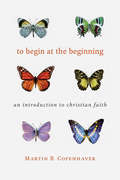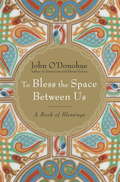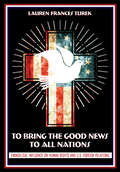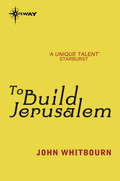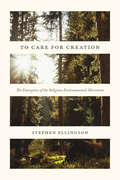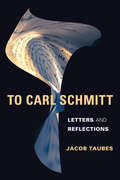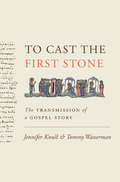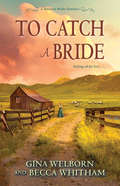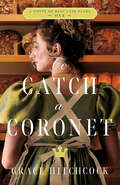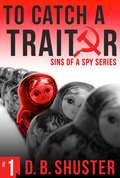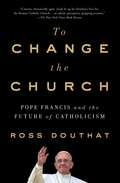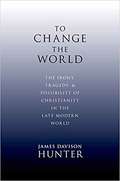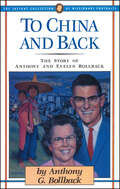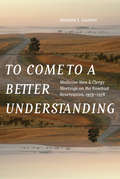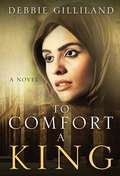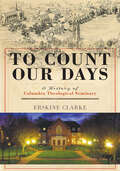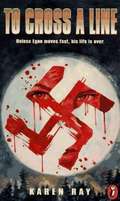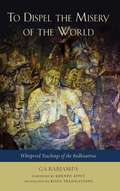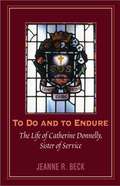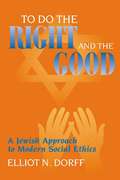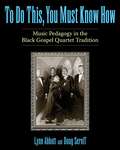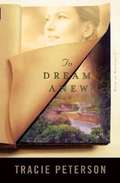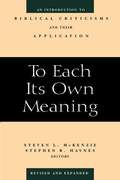- Table View
- List View
To Begin at the Beginning: An Introduction to the Christian Faith
by Martin B. CopenhaverChristian faith, says Martin Copenhaver, is not a subject to be mastered like calculus or Shakespeare; it is a story to be told and a life to be lived. No matter how much or how little you know, To Begin at the Beginning tells the story of Christian faith and invites you to take part in it. In this book Copenhaver covers basic themes—the Bible, church, ministry, sacraments, prayer, ethics—in a clear and inviting way. His approach creates a valuable resource for pastors, an accessible guide for seekers and new Christians, and a "refresher course" for longtime Christians who want to engage anew with what they believe.
To Begin at the Beginning: An Introduction to the Christian Faith
by Martin B. CopenhaverChristian faith, says Martin Copenhaver, is not a subject to be mastered like calculus or Shakespeare; it is a story to be told and a life to be lived. No matter how much or how little you know, To Begin at the Beginning tells the story of Christian faith and invites you to take part in it. In this book Copenhaver covers basic themes—the Bible, church, ministry, sacraments, prayer, ethics—in a clear and inviting way. His approach creates a valuable resource for pastors, an accessible guide for seekers and new Christians, and a "refresher course" for longtime Christians who want to engage anew with what they believe.
To Bless the Space Between Us: A Book of Blessings
by John O'DonohueFrom the author of the bestselling Anam Cara comes a beautiful collection of blessings to help readers through both the everyday and the extraordinary events of their lives. John O'Donohue, Irish teacher and poet, has been widely praised for his gift of drawing on Celtic spiritual traditions to create words of inspiration and wisdom for today. In To Bless the Space Between Us, his compelling blend of elegant, poetic language and spiritual insight offers readers comfort and encouragement on their journeys through life. O'Donohue looks at life's thresholds--getting married, having children, starting a new job--and offers invaluable guidelines for making the transition from a known, familiar world into a new, unmapped territory. Most profoundly, however, O'Donohue explains "blessing" as a way of life, as a lens through which the whole world is transformed. O'Donohue awakens readers to timeless truths and shows the power they have to answer contemporary dilemmas and ease us through periods of change.
To Bring the Good News to All Nations: Evangelical Influence on Human Rights and U.S. Foreign Relations (The United States in the World)
by Lauren Frances TurekWhen American evangelicals flocked to Latin America, Africa, Asia, and Eastern Europe in the late twentieth century to fulfill their Biblical mandate for global evangelism, their experiences abroad led them to engage more deeply in foreign policy activism at home. Lauren Frances Turek tracks these trends and illuminates the complex and significant ways in which religion shaped America's role in the late–Cold War world. In To Bring the Good News to All Nations, she examines the growth and influence of Christian foreign policy lobbying groups in the United States beginning in the 1970s, assesses the effectiveness of Christian efforts to attain foreign aid for favored regimes, and considers how those same groups promoted the imposition of economic and diplomatic sanctions on those nations that stifled evangelism.Using archival materials from both religious and government sources, To Bring the Good News to All Nations links the development of evangelical foreign policy lobbying to the overseas missionary agenda. Turek's case studies—Guatemala, South Africa, and the Soviet Union—reveal the extent of Christian influence on American foreign policy from the late 1970s through the 1990s. Evangelical policy work also reshaped the lives of Christians overseas and contributed to a reorientation of U.S. human rights policy. Efforts to promote global evangelism and support foreign brethren led activists to push Congress to grant aid to favored, yet repressive, regimes in countries such as Guatemala while imposing economic and diplomatic sanctions on nations that persecuted Christians, such as the Soviet Union. This advocacy shifted the definitions and priorities of U.S. human rights policies with lasting repercussions that can be traced into the twenty-first century.
To Build Jerusalem
by John WhitbournOne morning in 1995, Jonah Ransom, clothier, is going about his everyday business when he meets a beautiful demon in his storecupboard. At around the same time, the King of England with his entire court, vanishes abruptly before the astonished eyes of his public as he prepares to attend Mass. Even in an England where the Reformation failed, and magic has become a commonplace tool of the all-powerful Catholic Church, such events could be described as unusual.Before long, it is apparent that something very different is abroad - magic ceases to work in its accustomed way, instability and political unrest threaten to disrupt a society used to order and rigid social obedience. Eventually the Pope is sufficiently perturbed to send one of his beloved (by him) and dreaded (by the public in general) Sicarii to investigate the disturbance. Arriving late on the scene, Adam (he has no other name), Sicarii extraordinaire, sometime spy, sometime security officer, sometime assassin, discovers a mystifying, malicious power at work, a power that can twist not only souls, but his entire world inside out.
To Care for Creation: The Emergence of the Religious Environmental Movement
by Stephen EllingsonControversial megachurch pastor Mark Driscoll proclaimed from a conference stage in 2013, “I know who made the environment and he’s coming back and going to burn it all up. So yes, I drive an SUV.” The comment, which Driscoll later explained away as a joke, highlights what has been a long history of religious anti-environmentalism. Given how firmly entrenched this sentiment has been, surprising inroads have been made by a new movement with few financial resources, which is deeply committed to promoting green religious traditions and creating a new environmental ethic.To Care for Creation chronicles this movement and explains how it has emerged despite institutional and cultural barriers, as well as the hurdles posed by logic and practices that set religious environmental organizations apart from the secular movement. Ellingson takes a deep dive into the ways entrepreneurial activists tap into and improvise on a variety of theological, ethical, and symbolic traditions in order to issue a compelling call to arms that mobilizes religious audiences. Drawing on interviews with the leaders of more than sixty of these organizations, Ellingson deftly illustrates how activists borrow and rework resources from various traditions to create new meanings for religion, nature, and the religious person’s duty to the natural world.
To Carl Schmitt: Letters and Reflections (Insurrections: Critical Studies in Religion, Politics, and Culture)
by Jacob TaubesA philosopher, rabbi, religious historian, and Gnostic, Jacob Taubes was for many years a correspondent and interlocutor of Carl Schmitt (1888–1985), a German jurist, philosopher, political theorist, law professor—and self-professed Nazi. Despite their unlikely association, Taubes and Schmitt shared an abiding interest in the fundamental problems of political theology, believing the great challenges of modern political theory were ancient in pedigree and, in many cases, anticipated the works of Judeo-Christian eschatologists. In this collection of Taubes's writings on Schmitt, the two intellectuals work through ideas of the apocalypse and other central concepts of political theology. Taubes acknowledges Schmitt's reservations about the weakness of liberal democracy yet distances himself from his prescription to rectify it, arguing the apocalyptic worldview requires less of a rigid hierarchical social ordering than a community committed to the importance of decision making. In these writings, a sharper and more nuanced portrait of Schmitt's thought emerges, as well as a more complicated understanding of Taubes, who has shaped the work of Giorgio Agamben, Peter Sloterdijk, and other major twentieth-century theorists.
To Cast the First Stone: The Transmission of a Gospel Story
by Jennifer Knust Tommy WassermanThe story of the woman taken in adultery features a dramatic confrontation between Jesus and the Pharisees over whether the adulteress should be stoned as the law commands. In response, Jesus famously states, “Let him who is without sin be the first to throw a stone at her.” To Cast the First Stone traces the history of this provocative story from its first appearance to its enduring presence today.Likely added to the Gospel of John in the third century, the passage is often held up by modern critics as an example of textual corruption by early Christian scribes and editors, yet a judgment of corruption obscures the warm embrace the story actually received. Jennifer Knust and Tommy Wasserman trace the story’s incorporation into Gospel books, liturgical practices, storytelling, and art, overturning the mistaken perception that it was either peripheral or suppressed, even in the Greek East. The authors also explore the story’s many different meanings. Taken as an illustration of the expansiveness of Christ’s mercy, the purported superiority of Christians over Jews, the necessity of penance, and more, this vivid episode has invited any number of creative receptions. This history reveals as much about the changing priorities of audiences, scribes, editors, and scholars as it does about an “original” text of John.To Cast the First Stone calls attention to significant shifts in Christian book cultures and the enduring impact of oral tradition on the preservation—and destabilization—of scripture.
To Catch a Bride (A Montana Brides Romance)
by Gina Welborn Becca WhithamA Montana Brides Inspirational Romance Across the vast Montana Territory, dreams have no limits . . . and prayers can be answered in the most unexpected ways. After the untimely death of her husband, Marilyn Svenson has one option to keep her isolated ranch in Montana Territory: Remarriage. Of the two men in the rough mining town of Helena who fit her criteria for a husband, the charming resale shop owner is her preferred choice. Logically, she proposes. David Pawlikowski came west to escape past heartbreak. Just when he thinks he’s content, Marilyn shakes up his bachelor life with her innovative spirit and unexpected marriage proposal. As much as David would like to say yes to the beautiful widow, he’s thinks Marilyn would be better off with the town’s dapper new lawyer. But when real danger closes in, only Marilyn can decide whom to keep close to her side forever.
To Catch a Coronet
by Grace HitchcockSometimes the only way to outsmart a scandal is to find a crown big enough to silence it Muriel Beau, country baker turned heiress, can't stop instigating outrage. She discards two arranged engagements, then further antagonizes Kent society by publicly proposing to a baron at a ball. His rejection leaves her with no choice but to flee to the city and to secure a coronet so splendid that her peers will forget her debacles. The glitter of the London courts convinces Muriel that it's possible to find the future she dreams of, until she finds herself entangled in yet another escapade--one that may cost her more than her crumbling reputation. After years of serving as a privateer under an assumed name, Captain Erik Draycott, heir to Draycott Castle and soon to assume his uncle's title of Earl, returns to his London home to find it in disrepair thanks to his longtime nemesis. A staunch bachelor intent on returning to his ship, the captain is shocked when his mentor encourages him to take a wife. But while his alleged pauper status causes the potential London brides to turn their noses up at him, the ladies of Kent have no such qualms and are eager to fill his coffers with their fathers' wealth. Caught in a whirlwind of high society and high seas, Muriel and Erik navigate a risky undertaking that threatens their futures and creating stakes that soar above the masts of Erik's ship. Will Muriel's bold charm and Erik's daring bravery be enough to outsmart the scandal and secure a future as glittering as the crown Muriel seeks? "To Catch a Coronet by Grace Hitchcock is perfect Regency! This hilarious novel has it all: sparkling dialogue, a spunky heroine with a penchant for baking, and a dreamy hero who loves her in spite of her antics. I loved it and highly recommend!" --Colleen Coble, USA Today best-selling author of Fragile Designs
To Catch a Traitor (Sins of a Spy #1)
by D. B. ShusterEvery family has its secrets. In 1980s Moscow, keeping them is a matter of survival.As the Cold War escalates, the Soviet Union’s Jewish community finds itself caught in a tug of war between their allies abroad who want to open the doors to emigration and a country that hates them but won’t let them leave.A Jew in Moscow, Sofia knows better than most how high the stakes are. Her family is among the thousands who have been watched, harassed, and hunted for their defiance of the Soviet machine. Her own husband was sentenced to five harrowing years in the gulag simply for teaching Hebrew. Sofia has dared even greater risks to help her people, and if she’s caught, she won’t be sent to the gulag. She’ll be executed.When her husband is released from prison six months early, she should be overjoyed, but the KGB has eyes and ears everywhere. Anyone could be an informant, even the beloved husband who has finally returned. A shell of his former self, he can’t--or won’t--explain his unexpected reprieve, and he’s acting guilty. She suspects he’s harboring dangerous secrets of his own. How can she trust him with hers? The Americans meets Bridge of Spies in this can't-put-down Cold War story of intrigue and betrayal. Sins of a Spy1. To Catch a Traitor - released in August 2018 2.To Hunt a Spy - released in January 2019
To Change the Church: Pope Francis and the Future of Catholicism
by Ross DouthatA New York Times columnist and one of America’s leading conservative thinkers considers Pope Francis’s efforts to change the church he governs.Born Jorge Mario Bergoglio in 1936, today Pope Francis is the 266th pope of the Roman Catholic Church. Pope Francis’s stewardship of the Church, while perceived as a revelation by many, has provoked division throughout the world. “If a conclave were to be held today,” one Roman source told The New Yorker, “Francis would be lucky to get ten votes.” In To Change the Church, Douthat explains why the particular debate Francis has opened—over communion for the divorced and the remarried—is so dangerous: How it cuts to the heart of the larger argument over how Christianity should respond to the sexual revolution and modernity itself, how it promises or threatens to separate the church from its own deep past, and how it divides Catholicism along geographical and cultural lines. Douthat argues that the Francis era is a crucial experiment for all of Western civilization, which is facing resurgent external enemies (from ISIS to Putin) even as it struggles with its own internal divisions, its decadence, and self-doubt. Whether Francis or his critics are right won’t just determine whether he ends up as a hero or a tragic figure for Catholics. It will determine whether he’s a hero, or a gambler who’s betraying both his church and his civilization into the hands of its enemies.
To Change the World: The Irony, Tragedy, and Possibility of Christianity In the Late Modern World
by James Davison HunterThe call to make the world a better place is inherent in the Christian belief and practice. But why have efforts to change the world by Christians so often failed or gone tragically awry? And how might Christians in the 21st century live in ways that have integrity with their traditions and are more truly transformative? In To Change the World, James Davison Hunter offers persuasive--and provocative--answers to these questions. Hunter begins with a penetrating appraisal of the most popular models of world-changing among Christians today, highlighting the ways they are inherently flawed and therefore incapable of generating the change to which they aspire. Because change implies power, all Christian eventually embrace strategies of political engagement. Hunter offers a trenchant critique of the political theologies of the Christian Right and Left and the Neo-Anabaptists, taking on many respected leaders, from Charles Colson to Jim Wallis and Stanley Hauerwas. Hunter argues that all too often these political theologies worsen the very problems they are designed to solve. What is really needed is a different paradigm of Christian engagement with the world, one that Hunter calls "faithful presence"--an ideal of Christian practice that is not only individual but institutional; a model that plays out not only in all relationships but in our work and all spheres of social life. He offers real-life examples, large and small, of what can be accomplished through the practice of "faithful presence." Such practices will be more fruitful, Hunter argues, more exemplary, and more deeply transfiguring than any more overtly ambitious attempts can ever be. Written with keen insight, deep faith, and profound historical grasp, To Change the World will forever change the way Christians view and talk about their role in the modern world.
To China and Back: The Story of Anthony and Evelyn Bollback (The\jaffray Collection Of Missionary Portraits Ser.)
by Anthony G. BollbackTo China And Back describes the multi-faceted ministry of Anthony and Evelyn Bollback which affirms that God intervenes in the everyday affairs of those who love Him and habitually seek His guidance. Hardly yet able to communicate in Chinese, the Bollbacks were forced to flee China and to continue their missionary careers in Japan and Hong Kong. And always, there was the usual and unexpected.
To China and Back: The Story of Anthony and Evelyn Bollback (The\jaffray Collection Of Missionary Portraits Ser.)
by Anthony G. BollbackTo China And Back describes the multi-faceted ministry of Anthony and Evelyn Bollback which affirms that God intervenes in the everyday affairs of those who love Him and habitually seek His guidance. Hardly yet able to communicate in Chinese, the Bollbacks were forced to flee China and to continue their missionary careers in Japan and Hong Kong. And always, there was the usual and unexpected.
To Come to a Better Understanding: Medicine Men and Clergy Meetings on the Rosebud Reservation, 1973–1978
by Sandra L. GarnerTo Come to a Better Understanding analyzes the cultural encounters of the medicine men and clergy meetings held on Rosebud Reservation in St. Francis, South Dakota, from 1973 through 1978. Organized by Father Stolzman, a Catholic priest studying Lakota religious practice, the meetings fit the goal of the recently formed Medicine Men’s Association to share its members’ knowledge about Lakota thought and ritual. Both groups stated that the purpose of the historic theological discussions was “to come to a better understanding.” Though the groups ended their formal discussions after eighty-four meetings, Sandra L. Garner shows how this cultural exchange reflects a rich Native intellectual tradition and articulates the multiple meanings of “understanding” that necessarily characterize intercultural encounters. Garner examines the exchanges of these two very different cultures, which share a history of inequitable power relationships, to explore questions of cultural ownership and activism. These meetings were another form of activism, a “quiet side” without the militancy of the American Indian Movement. Based on ethnographic fieldwork and archival analysis, this volume focuses on the medicine men participants—who served as translators, interpreters, and cultural mediators—to explore how modern political, social, and religious issues were negotiated from an indigenous perspective that valued experience as critical to understanding.
To Comfort A King
by Debbie GillilandWhen Abishag leaves her home to fulfill the commission to comfort King David during his final months of life, she leaves behind a deaf sister, a small brother, and a father who is still grieving the death of his wife. Also left behind is Abishag's betrothed, Joseph, who has already waited many months to claim his bride. Now, he must wait until Israel's king no longer needs her. Torn from the comfort of her small village, Abishag is thrust into a world of unfamiliar customs, royal expectations, and palace intrigue. She is greeted suspiciously by the king's concubines, warmly by Queen Bathsheba, and reluctantly by King David himself. Adonijah, the king's son, is bitter over his father s choice of Solomon as Israel's next king. He determines to ruin Abishag to prevent her from being given as a prize to Solomon at their father's death. Suffering personal losses, as well as scorn from much of the royal court, Abishag begins to question God's goodness in placing her in the king's service. Can she find someone there who understands that one who comforts the king is in great need of comfort herself? Will Abishag's time with the king end in despair or joy?
To Count Our Days: A History of Columbia Theological Seminary
by Erskine ClarkeAn in-depth look at the institution as the center of many important cultural shifts with which the South and the wider Church have wrestled historically.Columbia Theological Seminary’s rich history provides a window into the social and intellectual life of the American South. Founded in 1828 as a Presbyterian seminary for the preparation of well-educated, mannerly ministers, it was located during its first one hundred years in Columbia, South Carolina. During the antebellum period, it was known for its affluent and intellectually sophisticated board, faculty, and students. Its leaders sought to follow a middle way on the great intellectual and social issues of the day, including slavery. Columbia’s leaders, Unionists until the election of Lincoln, became ardent supporters of the Confederacy. While the seminary survived the burning of the city in 1865, it was left impoverished and poorly situated to meet the challenges of the modern world. Nevertheless, the seminary entered a serious debate about Darwinism. Professor James Woodrow, uncle of Woodrow Wilson, advocated a modest Darwinism, but reactionary forces led the seminary into a growing provincialism and intellectual isolation.In 1928 the seminary moved to metropolitan Atlanta signifying a transition from the Old South toward the New (mercantile) South. The seminary brought to its handsome new campus the theological commitments and racist assumptions that had long marked it. Under the leadership of James McDowell Richards, Columbia struggled against its poverty, provincialism, and deeply embedded racism. By the final decade of the twentieth century, Columbia had become one of the most highly endowed seminaries in the country, had internationally recognized faculty, and had students from all over the world and many Christian denominations.By the early years of the twenty-first century, Columbia had embraced a broad diversity in faculty and students. Columbia’s evolution has challenged assumptions about what it means to be Presbyterian, southern, and American, as the seminary continues its primary mission of providing the church a learned ministry.“A well written and carefully documented history not only of Columbia Theological Seminary, but also of the interplay among culture, theology, and theological institutions. This is necessary reading for anyone seeking to discern the future of theological education in the twenty-first century.” —Justo L. González, Church Historian, Decatur, GA“Clarke’s engaging history of one institution is also an incisive study of change in Southern culture. This is institutional history at its best. Clarke takes us inside a school of theology but also lets us feel the outside forces always pressing in on it, and he writes with the skill of a novelist. A remarkable accomplishment.” —E. Brooks Holifield, Emory University
To Cross A Line
by Karen RayIn 1938, after a minor traffic accident, seventeen-year-old Egon Katz joins an increasing number of German Jews desperately trying to find a way out of the country.
To Dispel the Misery of the World
by Ga Rabjampa Khenpo Appey Rigpa Translations"Offered here is the pith advice on mind training according to the great vehicle. This is the path followed by all the buddhas and their children of the past, present, and future, the most profound instruction of the oral lineage, and the quintessence of the ocean of all the excellent teachings."--Ga Rabjampa This short book contains a wealth of advice for those wanting to become more fully human. When we are disconnected from others we flounder; only by recognizing the profound interdependence of all beings do we flourish and grow. The famous Seven-Point Mind Training, in just a few pages of one-line instructions, provides direct and powerful advice for breaking through the chronic barriers that separate us from those around us. It is easy to see why it is one of the most cherished texts in all of Tibetan Buddhism. Ga Rabjampa, an influential master of the fifteenth century, here uses the Seven-Point Mind Training as the basis for illuminating the essential teachings on Buddhism, giving special attention to the practices of giving and taking (tonglen) and of transforming adversity into opportunities for spiritual growth.
To Do and to Endure: The Life of Catherine Donnelly, Sister of Service
by Jeanne R. Beck"In her portrayal of the life of Sister Catherine Donnelly, founder of the Sisters of Service, author Jeanne Beck has succeeded in weaving a tapestry rich in texture, broad in scope and deeply revealing of the character of a memorable Canadian woman."-Brian F. Hogan, C.S.B.When teacher Catherine Donnelly first arrived in Western Canada from Ontario in 1918, she discovered two things: first, the need for a Catholic presence in the rural public schools of the west, and second, her own calling to be a religious.Catherine saw that the west was growing rapidly, and that there was a lack of religious guidance for the people of the region, particularly the immigrants coming from other countries. She looked to existing Catholic orders as a means of reaching these people, but found that none of the orders were willing to accept Catherine’s radical ideas, such as her refusal to wear the traditional nun’s habit, and her strong belief in the individuality of members of orders. Catherine founded the Sisters of Service in 1922, and through this new order was able to make an impact on the lives of townspeople and students in prairie schools of the west.In this biography, Jeanne Beck reconstructs the extraordinary life of Sister Catherine Donnelly. The well-researched account is at once informative and inspiring a fitting tribute to the woman who believed "the spiritual life and the intellectual life have the same root deep in the unity of the intelligence."
To Do the Right and the Good: A Jewish Approach to Modern Social Ethics
by Elliot N. DorffFrom the preface: One glance at the contents of this book amply explains why anyone would be interested in its topics: Communal relations, interfaith relations, national policy, procedural justice, poverty, war, and forgiveness among individuals and communities are issues that have deeply affected human life from its very inception. The modern world's instant communication over any distance; its internationally interwoven economy; its capabilities of mass destruction; and its simultaneous potential for true global learning, understanding, and enrichment make these age- old issues all the more compelling. Some of the old answers seem to do just fine in our modern world, whereas others seem to be woefully inadequate. In some cases, we are not even sure how to apply ancient wisdom to the new circumstances in which we find ourselves. New explorations of these issues, then, are clearly in order.
To Do This, You Must Know How: Music Pedagogy in the Black Gospel Quartet Tradition (American Made Music Series)
by Lynn Abbott Doug SeroffTo Do This, You Must Know How traces black vocal music instruction and inspiration from the halls of Fisk University to the mining camps of Birmingham and Bessemer, Alabama, and on to Chicago and New Orleans. In the 1870s, the Original Fisk University Jubilee Singers successfully combined Negro spirituals with formal choral music disciplines and established a permanent bond between spiritual singing and music education. Early in the twentieth century there were countless initiatives in support of black vocal music training conducted on both national and local levels. The surge in black religious quartet singing that occurred in the 1920s owed much to this vocal music education movement. In Bessemer, Alabama, the effect of school music instruction was magnified by the emergence of community-based quartet trainers who translated the spirit and substance of the music education movement for the inhabitants of working-class neighborhoods. These trainers adapted standard musical precepts, traditional folk practices, and popular music conventions to create something new and vital Bessemer's musical values directly influenced the early development of gospel quartet singing in Chicago and New Orleans through the authority of emigrant trainers whose efforts bear witness to the effectiveness of “trickle down” black music education. A cappella gospel quartets remained prominent well into the 1950s, but by the end of the century the close harmony aesthetic had fallen out of practice, and the community-based trainers who were its champions had virtually disappeared, foreshadowing the end of this remarkable musical tradition.
To Dream Anew (Heirs of Montana # #3)
by Tracie PetersonHeirs of Montana book 3. Though the Diamond V ranch is flourishing and their own family growing, Dianne and Cole Selby find their hard-earned success threatened as a band of Indians on the warpath inch closer to the valley they call home. When a new family settles in the area with ambitions to establish an empire in Montana, it quickly becomes apparent that they will stop at nothing to uproot Dianne's family from the land they've nourished and come to love. Peterson's vivid writing enlivens this pioneer saga of the Chadwicks and Selbys as they endure devastating losses and find unexpected joys.
To Each its Own Meaning: An Introduction to Biblical Criticisms and their Application
by Steven L. Mckenzie Stephen R. HaynesThis volume introduces the reader to the most important methods of biblical criticism. It serves as an indispensable handbook for the work of students approaching biblical studies for the first time and for the professional interpreter of scripture who wants to understand the latest currents in biblical scholarship.
